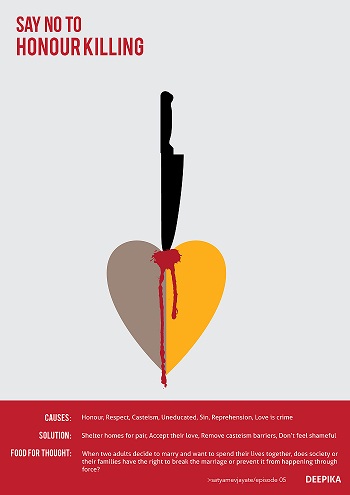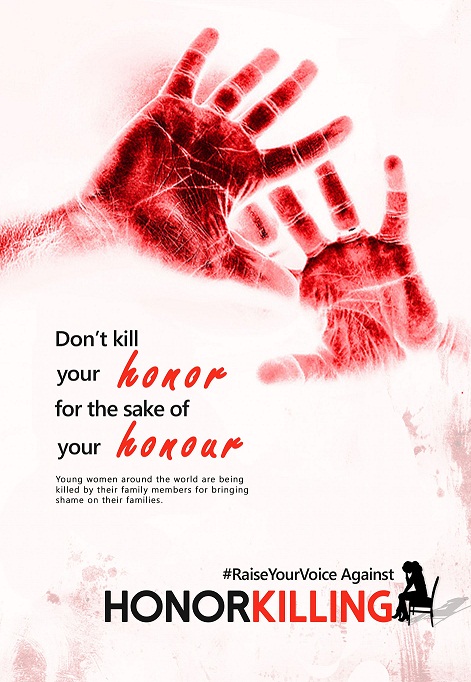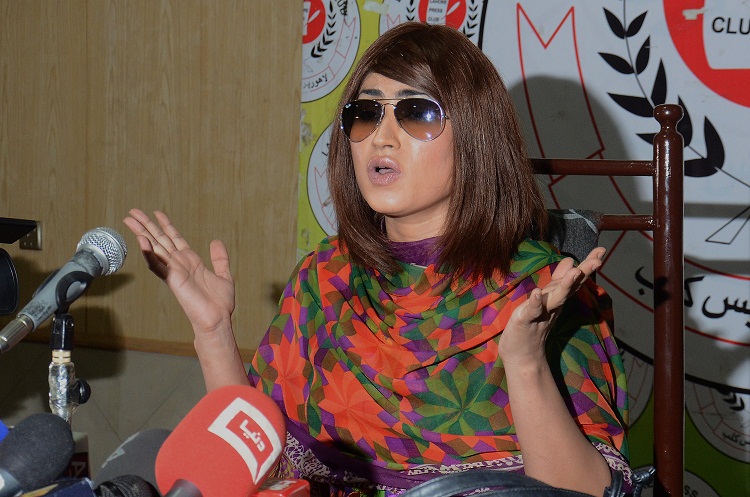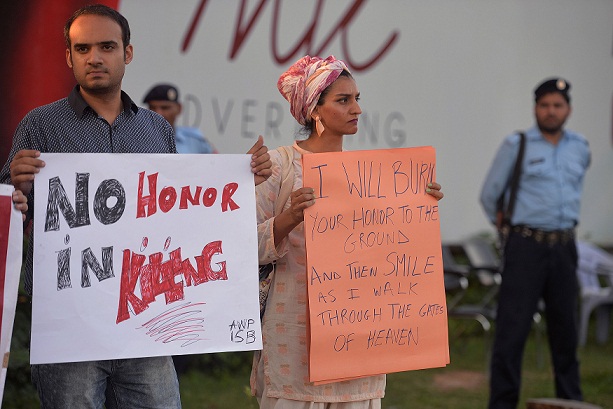The Menace of Honour Killings in Pakistan
There is no honour in killing!
Abdul Rasool Syed
Woefully speaking, women in our country are subjected to various kinds of abuse and persecution. Rape, domestic violence, forced marriage, acid attacks and honour killing are the most common injustices that a Pakistani woman has to face in our patriarchal society. Of all these crimes against the womenfolk, honour killing is the most heinous and it is, unfortunately, increasing at a disturbing rate in our society. Figures collected by various research organizations in this regard are quite startling and heart-wrenching. According to one estimate, Pakistan has the highest volume of documented and estimated honour killing per capita in the world – about one-fifth of the world’s honour killings happen in Pakistan (1000 out of the 5000 per year, in total).
Despite enactment of harsh legal penalties to put an end to this burgeoning social menace, we, as a nation, have miserably failed to achieve something worthwhile in this respect. Rather than decreasing, this shameful social evil is ballooning day in day out in our society.
Honour killing is defined as murdering a member of the family in the name of honour; it is usually the female who is murdered for the ‘crime’ of bringing shame to the family. In rare cases, men are also victims of this heinous practice, if they bring dishonour to their family or community.
In our country, honour killing is ubiquitous in all four provinces. However, Sindh and Blochistan are the most affected ones. In Sindh, this shameful practice is called “Karo Kari,” and in Balochistan, this is dubbed as “Siahkari” or “Siakhel”.
 There are a myriad of causes of growing honour killing in our society. The most prominent of them is contracting the marriage to a person of one’s own choice. According to Article 16 of the Universal Declaration of human rights, both men and women of full age, irrespective of race, religion and nationality can enter into marriage with any partner of their choice. Our religion Islam does also permit both men and women to marry a person of their own choice. But, due to rampant male-chauvinism and patriarchy in our society, such practice is not encouraged; women, on the contrary, are seen as commodity, owned and controlled by their fathers, husbands and brothers. Therefore, if any woman goes against the will of her so-called male owners and weds according to her own choice, she is brutally sent to cemetery in the name of honour.
There are a myriad of causes of growing honour killing in our society. The most prominent of them is contracting the marriage to a person of one’s own choice. According to Article 16 of the Universal Declaration of human rights, both men and women of full age, irrespective of race, religion and nationality can enter into marriage with any partner of their choice. Our religion Islam does also permit both men and women to marry a person of their own choice. But, due to rampant male-chauvinism and patriarchy in our society, such practice is not encouraged; women, on the contrary, are seen as commodity, owned and controlled by their fathers, husbands and brothers. Therefore, if any woman goes against the will of her so-called male owners and weds according to her own choice, she is brutally sent to cemetery in the name of honour.
Another cause of honour killing pertains to those women who seek divorce from their husbands. The husband of a wife who demands khula (the dissolution of marriage) alleges her of having illicit relations with somebody else and, thus, finds an alibi for murdering her in the name of honour.
Killing for rape is another brutality that is committed in the name of honour. Ironically, if any woman is raped; the members of her family think as if she has brought shame to their honour. And, instead of helping her to come out of the physical and mental anguish and trauma that she had gone through due to someone’s barbarism, they bump her off covertly to save their so-called honour.
Moreover, the ratio of honour killings is higher in regions where there is abundance of agriculture land. In Sindh and Balochistan, land is the main reason behind most honour killings which in these areas is just like ‘a quick scheme to get rich’.
Shamefully, many individuals exploit the honour killing for gaining pecuniary benefits or land. For instance, in Sindhi practice of Karo-kari if both individuals accused of Karo-kari are murdered, the matter usually ends but if only Kari (the female) is killed and Karo (the male) escapes, he has to compensate the male heir of Kari by giving him money, land or even a woman. In some cases, honour killing is used also to settle the score with an enemy. The enemy is somehow invited at home and is then slain in cold blood under the charge of “Karo-kari”.
 In order to wipe out the evil of honour killing, the government of Pakistan has introduced various legal reforms but so far they have not yielded any heartening result. It is because of the loopholes in our substantive as well procedural laws that have kept the conviction rate abysmally low in cases of honour crimes.
In order to wipe out the evil of honour killing, the government of Pakistan has introduced various legal reforms but so far they have not yielded any heartening result. It is because of the loopholes in our substantive as well procedural laws that have kept the conviction rate abysmally low in cases of honour crimes.
The first laws pertaining to honour killing in Pakistan are rooted in British colonial rule. In 1835, the British established a law commission to examine the issue of honour killings. The commission sympathized with men who were “dishonoured” by their wives, sisters and daughters. It concluded that if a man could prove that he had killed the man under such provocation, the killing should not be deemed as murder but the lesser offence of manslaughter.
In 1990, Pakistan incorporated three elements of Islamic Laws into the Pakistan Penal Code, 1860: Wali (heir of the victim), Qisas (retaliation/punishment) and Diyat (blood money/forgiveness). The effect of these amendments enabled men to kill sisters, wives and daughters to restore what they felt as the loss of honour, whilst avoiding punishment for their crimes.
In case of intentional murder, Wali has the power to “voluntarily and without duress, waive the right of Qisas and any Wali who has chosen not to prosecute the offender is entitled to Diyat. Article 306 of the Pakistan Penal Code (PPC) states that Qatl-i-Amd [a wilful murder] would not be punished “(b) when an offender causes death of his child or grand-child, how low-so-ever; and (c) when any wali of the victim is a direct descendant, how low-so-ever, of the offender.” This means the murder of an individual, who is direct descendant of the offender, goes unpunished. In the case of a wife who had been murdered by her husband, the offender was exempt from Qisas if the couple has children since the child is the “heir of the victim,” would be a direct descendant of the husband.
The PPC also gave the victim’s legal heir a right to forgive the offender’s crime in exchange for monetary compensation for pardoning the one who has committed the homicide. The exchange of Diyat for a pardon was most commonly used for family members to pardon perpetrators who had killed their wives, sisters or mothers.

However, in the wake of publicity surrounding “A Girl in the River” and the murder of a model and social media celebrity Qandeel Baloch by her brother for, in his words, “bringing disrepute to the family’s honour,” former Prime Minister Nawaz sharif proclaimed his commitment to eliminate honour killing by amending the PPC to plug in the legal loopholes, which were giving way out to the perpetrators of honour killings to go scot-free.
To this end, in October 2016, the parliament passed a bill which mandates life imprisonment or death penalty for the convicted murderers, whose motive for killing was supposed to be the restoration of honour. Apart, with respect to Wali pardoning the accused and accepting Diyat, the amendment provides that those guilty of honour crimes will be sentenced to life imprisonment regardless of whether a pardon is granted by the victim’s legal heir.
Unfortunately, this experiment failed. According to the statistics maintained by the Human Rights Commission of Pakistan, as many as 1,280 people have been murdered in honour crimes since the enactment of the law. For more than half of these, no FIRs were registered or there was no information. Obviously, cases in which no FIR is registered there is no criminal prosecution. In addition, according to the experts, these numbers, which are based on estimates from the news media and similar sources, are likely underreported.
On its face, the amendment appears to be the right step for eradication of honour killing. But, it does have has a number of faults. Judges, for example, have wide discretion under the amendment to decide whether a particular killing is simple murder or a murder in the name of honour and whether to impose a life sentence rather than death penalty.
Moreover, perpetrators may also claim that their actions were motivated by factors other than restoration of honour in order to avoid mandatory sentences of life imprisonment or death. Thus, if a man is accused of committing an honour crime and he denies that his motive was based on the grounds of honour, he faces a sentence of up to twenty-five years. However, he cannot be pardoned by the victim’s family because Diyat was eliminated from the PPC for honour killing, not plain homicide.
To cap it all, we as enlightened members of the society should raise our voice against this shameful and barbaric social evil. The executive as well as the judiciary should work hand in hand to bring the culprits to the book. It requires collective will of the nation, but, unfortunately, like on various other matters, the nation seems to be divided on this grave issue as well. The fact of the matter is that the practice has relatively high rate of approval in our society. According to a PEW research poll, 4 out of 10 Pakistanis agreed to the practice of honour killing. In fact, when 2016 amendment was adopted, only one-third of the representatives in the parliament chose to attend. A conservative senator, Hafiz Hamdullah, expressed sentiments of many, stating that the government was trying to enforce Western values in the country. However, the government should not listen to such conservative voices and work diligently for the promotion of human rights without any reservation; after all, this is the matter pertaining to the honour of our nation as a whole…
Honour crimes: An introduction
Honour crimes are a multifaceted issue and change according to time, place, culture and in the ways they are executed and articulated. Due to this complex and elastic nature they are widely misunderstood and hard to define. Sociologists and human and women’s rights workers have defined honour crimes in different ways.
According to one definition:
Honour crimes are patterns of conduct cutting across communities, cultures, religions and nations and manifested in a range of forms of violence directed, in the majority of cases, against women, including murder (honour killings) and forced marriage.
Another definition explains honour crimes in this way:
Crimes of honour are actions that remove a collective stain and dishonour, both gendered and locally defined, through the use of emotional, social and physical coercion over a person whose actual or imputed actions have brought that dishonour.
Lynn Welchman and Sara Hossain, co-directors of the Honour Crimes Project, Sweden, have described honour crimes as a “type of violence against women characterised by (claimed) ‘motivation’ rather than perpetrator or form of manifestation.”
From the above-mentioned definitions it becomes clear that honour crimes are a wide category and besides killing also include battering, acid throwing, rape in the name of honour, genital mutilation, domestic imprisonment, prescriptive dress codes and restricted access to education or work.
 Jahangir's World Times First Comprehensive Magazine for students/teachers of competitive exams and general readers as well.
Jahangir's World Times First Comprehensive Magazine for students/teachers of competitive exams and general readers as well.



